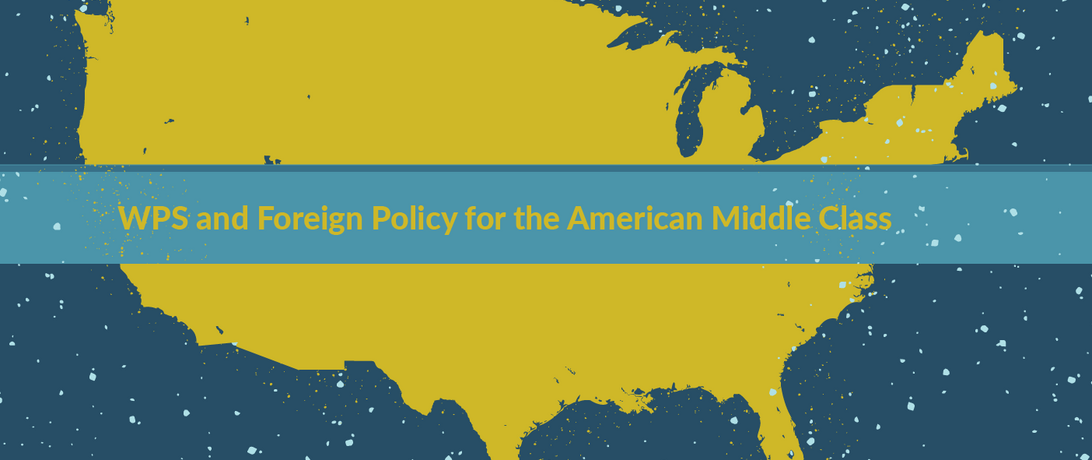
How can WPS impact the Biden administration’s new orientation of foreign policy for the American middle class?
We now have the oldest President to take office in US history, but we are also welcoming one of its youngest National Security Advisors, Jake Sullivan. His appointment represents a break from the traditional, bipartisan foreign policy consensus. The “Blob”, as the foreign policy community is affectionately called, may no longer have a friendly ear in the White House; as Sullivan aims to create a foreign policy agenda that appeals to the interests of ordinary Americans.
To that point, the Carnegie Endowment for International Peace published a report on September 23, 2020 on transforming the foreign policy agenda of the US away from the long-established, bipartisan consensus internationalist playbook to one which listens to the American heartland. This is based on the understanding that there is a causal relationship between domestic and foreign policy, and that a strong and positive US presence abroad requires a domestic middle class to prosper. Ultimately, what brought down the Berlin Wall and the Iron Curtain was neither the Pentagon nor America’s Other Army, it was the promise of the American Dream.
Conversely, a precarious middle class leads to a withdrawing of American foreign policy from the international community, as we saw during President Trump’s America First agenda. But even there, the connections between domestic and foreign policies were clear: Trump linked immigration and trade to the domestic concerns of American voters.
Carnegie’s report seeks to address that connection, but links it back to an agenda that recognizes that Americans do not want an isolationist US withdrawing from its values and commitments abroad, nor a return to the Cold War-style nationalism and endless war against an ideology. By reorienting our foreign policy goals, the US can prioritize the needs and interests of our heartland.
Of its five broad recommendations, there is one strategy in the report that should be examined as it relates to the WPS agenda, because it directly addresses how it can be implemented. In order to increase the cost efficiency of our security spending, free up resources, and reduce the overextension of our foreign policy, the report recommends to “boost strategic warning systems and intelligence support to better head off costly shocks and build up protective systems at home”.
Here, we see the tension drawn between the priorities at home and abroad, where policymakers must meet unlimited needs with limited resources. As noted in a previous OSF article, the WPS Act is the policy tool to synergize our domestic issues with our foreign policy through the use of early warning indicators. By anticipating and heading off costly shocks, while also addressing problems in society, implementing the WPS Act to its fullest potential will kill two birds with one stone.
In both domestic and international contexts, women are generally the first victims to point out breakdowns in human security, predicting long-term deterioration or future acute crises. Where human security breaks down, we see it manifest in various, observable forms, such as when women begin selling jewelry due to food or economic insecurity, domestic and sex-specific violence cases increase. By directly addressing these issues, we can intercept the problems before they advance into widespread violence, increases in extremism, or a national security crisis.
In other words, gender analysis can produce early warning signals to destabilizing crises. In addition to its instrumental value, we can proactively address the needs of the communities in distress much sooner and more effectively. Whether it’s at home or abroad, when these indicators are reported and routinely ignored, or other issues are prioritized instead, we are being penny wise and pound foolish with our security tools. Rather, if we can be wise with our investments, not only can we spend less on our military, we can also prioritize the needs of our middle class at home.
If the US is serious about developing a foreign policy for the middle class, especially one that “boosts strategic warning systems … to better head off costly shocks and build up protective systems at home”, then it must also take seriously its commitments and policy tools of the WPS agenda. Preventing acute crises by incorporating gender analysis to our domestic and foreign policy tools, and thereby strengthening the resilience of our communities, will reduce costly shocks to our security apparatus and create an agenda that addresses the domestic concerns of all American voters.
Article Details
Published
Topic
Program
Content Type
Opinion & Insights